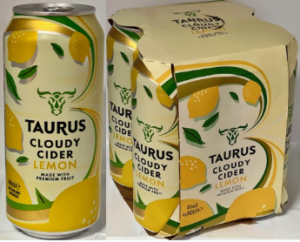
Innovative brands face more clouds on the legal horizon, as Aldi leaves Thatchers with a bitter taste
Aldi has, once again, successfully defended a trade mark infringement and passing off action for one of its “copycat” products. This time the focus is on its ‘Taurus Cloudy Cider’.
Background
Thatchers Cider Company Limited (Thatchers), the English cider maker, launched ‘Cloudy Lemon Cider’ (known in the case as “Thatchers Product”) in February 2020. This was its first non-apple cider in over a century of trading. As such, the branding was of key importance and the following “Trade Mark” was created:

Aldi subsequently launched its own lemon flavoured cloudy cider (“Aldi Product”), under its existing ‘Taurus’ brand with the following branding (“the Sign”):

The claim
Thatchers brought a claim for trade mark infringement on the basis that “the Sign”, being a single can of the Aldi product, is similar to the Thatchers “Trade Mark” and is used in relation to identical goods. The cider maker argued that there was a likelihood of confusion on the part of the public (Section 10(2)(b) of the Trade Marks Act (TMA)), and Aldi’s use takes unfair advantage of or is detrimental to the distinctive character or repute of Thatchers’ “Trade Mark” (Section 10(3) TMA). Thatchers also claimed that Aldi’s use was contrary to the law of passing off.
In summarising Thatchers’ particulars of claim, Judge Melissa Clarke noted that:
“Its case in relation to section 10(3) TMA is that the Court should infer that Aldi intentionally mimicked the appearance of the Thatchers Product in designing the appearance of the Aldi Product, and in doing so… intentionally set out to cause a link in the minds of consumers…”.
Decision
While Aldi admitted that the “Thatchers’ Product” was the “benchmark” for its product, the court held that:
“the overall appearance of the Aldi Product…is similar to the Trade Mark, but to a low degree”; and so: “there is no real likelihood that the average consumer…will be confused”.
Judge Clarke stated that the:
“dominating features of both marks are the “THATCHERS” brand on the Trade Mark and the “TAURUS” brand and bulls head device on the Sign which are dissimilar”.
The claim for trade mark infringement under Section 10(2)(b) TMA was therefore dismissed.
Although Judge Clarke was satisfied that Thatchers has a reputation in the “Trade Mark” throughout the UK; and that Aldi’s use of “the Sign” would cause a link between “the Sign” and the “Trade Mark” in the mind of the average consumer, it was held that: “Aldi’s use of the Sign does not take unfair advantage of and is not detrimental to the repute of the Trade Mark”.
The claim for trade mark infringement under Section 10(3) TMA was therefore dismissed.
Thatchers’ passing off claim was also unsuccessful as, while they may have goodwill in the “Trade Mark”, Judge Clarke stated:
“there is no evidence before me that any consumers believe that the Aldi Product is that of Thatchers, for example that is manufactured, or licensed, or approved by Thatchers… I am satisfied that there is no misrepresentation that Aldi is connected in trade with Thatchers”.
Comment
Our previous article on Brand Dilution discussed how creators of copycat products are well versed at sitting on the right side of the law by avoiding trade mark infringement and the tort of passing off. This has been highlighted in the case of Thatchers v Aldi.
The case emphasises the difficulties that brand owners face when trying to prohibit lookalikes in the market and, more concerningly, provides imitators with guidance on how “close they can sail to the wind” without being found to infringe or pass off the “benchmark” product.
It is interesting that Judge Clarke determined that: “Aldi did not develop the Aldi Product… with an intention to take advantage of the goodwill and reputation in the Trade Mark”, despite Aldi admitting that when provided with various packaging designs, it chose the one which was more similar to the “Thatchers Product”.
In any event, “intention” is not a requirement to bring a successful claim under Section 10(3) TMA. Nevertheless, Judge Clarke appears to have made this a focus when assessing if infringement has occurred under this claim, which may have been determined by Thatchers pleadings.
Thatchers may of course appeal the decision which, given the intention point, and as Mr Thatcher’s commented: “we are very disappointed that the Judge didn’t agree with us”, may be likely.
This may not be the end of the Cloudy Cider Contestation.
If you would like to continue the conversation, please contact the authors, Leah Calvert and Emily Marshall or one of Barker Brettell’s trade mark team.




